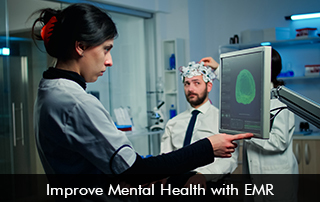Mental health can impact overall well-being and can keep individuals satisfied and happy with their lives. Mentally healthy adults can have a positive impact on both social and economic factors. In this fast-paced world mental health has become even more important than ever. Healthcare technology such as Electronic Medical Records (EMR) Software is making a great impact on mental health, improving patient care and transforming how mental healthcare is delivered.
Mental Illness in the USA
According to the CDC mental health is one of the most prevalent health conditions in the US. More and more people are stressed and depressed. Data has revealed that over 1 in 5 adults live with a mental condition that can affect their ability to make positive decisions. Of American adults about 1 in 25 live with a serious mental health condition including bipolar disorder and grave depression.
How can EHR Software Transform Mental Health Care?
Simplified Documentation
EMR software system creates digital records in place of conventional paper ones, speeding up and streamlining documentation. Physicians can enter and retrieve patient data rapidly, cutting down on paperwork time and freeing up more time for patient care. Effective treatment depends on accurate and current patient data, which are maintained through this streamlined approach.
Improved Communication
Comprehensive mental health care requires effective communication between healthcare providers. Better communication is made possible by EHR software, which gives several clinicians access to the same patient records. This makes it possible for primary care doctors, therapists, and psychiatrists to work together more skillfully and guarantee that a patient’s mental health needs are met as a whole.
Facilitates Patient Engagement
Patient empowerment can be a game-changer to boost health outcomes for patients suffering from mental health conditions. Electronic Medical Records Software offers patient engagement tools such as the patient portal software to help patients participate throughout their healthcare journey. Patients can also directly message their provider on a HIPAA-compliant platform.
Telehealth Integration in EMR Software for Mental Health
With the rise of telemedicine, particularly during the COVID-19 epidemic, remote access to EHR software has become increasingly vital. Many EHR systems now include telehealth, allowing therapists to schedule virtual appointments and access patient records from anywhere.
Telehealth integration in Electronic Health Records (EHR) Software enables patients to access consistent, high-quality care despite geographical limitations or pandemic-related restrictions. This flexibility is especially advantageous for people living in rural or underdeveloped areas, who may have limited access to mental health care. Furthermore, telehealth integration allows for timely interventions, fewer appointment cancellations, and real-time contact between physicians and patients. This can ultimately enhance patient involvement and outcomes in mental health care.







